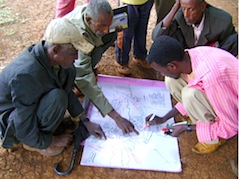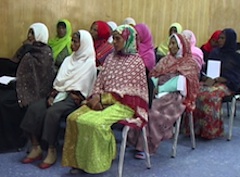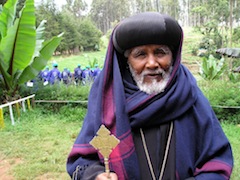|
|
|
|
 |
|
Ethiopia
ARC's faith partners in Ethiopia
Three faith groups in Ethiopia were among 26 Christian, Muslim and Hindu faith groups in sub-Saharan Africa that launched long-term environmental action plans at ARC's Many Heavens, One Earth, Our Continent Celebration in Nairobi, Kenya, in September 2012.
Ethiopian Evangelical Church Mekane Yesus
Ethiopian Islamic Affairs Supreme Council
Ethiopian Orthodox Tewahido Church
Read more about their activities below.
 |
 |
 |
The EECMY has set itself the target of planting 10 million trees and protecting 350 springs/water catchments in the next seven years |
Ethiopian Evangelical Church Mekane Yesus
The Ethiopian Evangelical Church Mekane Yesus (EECMY) became a national church in
1959. Today, with more than 5.8 million members, it is one of the biggest Lutheran church
organisations in Africa and is growing fast.
The Church is structured into 22 synods. It has
more than 7,000 congregations and 2,600 ordained ministers with a seminary, a college,
high schools, elementary schools, the Ethiopian Graduate School of Theology, hospitals,
clinics, a broadcasting agency, a printing house, and its own radio programmes.
Its long-term plan is co-ordinated through the development wing of the Church – the
Development and Social Services Commission (EECMY-DASSC). This is a non-profit
making organisation set up by the Church in 2000.
Long-term Commitment for a Living Planet
EECMY-DASSC brought together 40 participants from the Ethiopian Evangelical Church
Mekane Yeses Development and Social Services Commission, EECMY Church institutions representing 22 synods and DASSC field offices, church leaders, schools
teachers and development experts. All the Synods have drawn up their individual action plans for the next seven years.
A joint action plan agrees the priorities will include:
Mainstreaming climate change and the environment in their morning and evening
worship and incorporating these issues in the school curriculum;
Holding seminars of awareness creation on climate change;
Promoting participatory forest management and soil and water conservation;
Reforestation: The target is to have planted 10 million trees by year seven;
Improved livelihood income through fruit tree planting with the planting of 200,000
fruit trees by year seven;
Promoting improved forage management system and mud brick making;
Promoting the use of fuel wood saving stoves with 15,000 stoves in use by year seven;
Promoting termite control activities by reducing 100,000 mounds by year seven;
Spring protection/development with 350 springs protected by year seven.
More information
To read a summary of its plans, click here.
To read the full plan, click here.
 |
 |
 |
A meeting on the environment organised by the Ethiopian Islamic Affairs Supreme Council in December 2011 |
Ethiopian Islamic Affairs Supreme Council
The Ethiopian Islamic Affairs Supreme Council (EIASC) is the central organising body of the Muslim community in Ethiopia and represents 34% of Ethiopia’s population of 77 million. Under the EIASC there are 11 Regional Islamic Affairs Higher Councils comprised of zonal and district (wereda) level councils elected by the Muslim community.
The councils are connected to the community through the country’s 40,000 mosques. Each mosque serves around 150 families with an imam, a dae’es (religious preacher), ulema (religious scholars), a muezzin (prayer caller), a mufti (professor in religion) and an ustaz (madrassa school teacher).
All will be involved in EIASC’s long-term plan on the environment, working through not only the country’s mosques, Qur’anic schools, elementary and secondary schools and through teachers and imams but also through EIASC’s development wing, the Ethiopian Muslim Development Agency. This was set up in 2000 and has extensive experience in implementing community-based projects using mosques.
Long-term Commitment for a Living Planet
A key feature of EIASC's long-term plan is its three-year pilot mosque-based tree planting project. This is the first time mosques have been engaged in a drive to promote environmental protection in Ethiopia.
The Eco-Mosque approach
The programme:
will be piloted in 30 selected mosques in six districts (wereda) of three regions of Ethiopia;
is designed to be replicated through other areas and scaled up once shown to be successful;
will be underpinned by three days of national level training in environmental protection for 100 selected Muslim leaders, mosque imams, and mosque
development committee representatives from the three target regions
includes three days of training for 25 imams in each of the target districts;
will create a Tree Day each year, celebrated in each selected mosque with activities such as drama and art to promote a culture of conservation in Muslim communities;
includes establishing woodlots of up to 10,000 trees in each mosque to enable the community to become self sufficient in woodfuel supplies;
includes establishing a plant nursery and planting of fruit trees at mosque level.
More information
To read a summary of its plans, click here.
To read the full plan, click here.
 |
 |
 |
The Ethiopian Orthodox Tewahido Church is installing biogas digesters in its monasteries and training its community in sustainable land management |
Ethiopian Orthodox Tewahido Church – Development and Inter Church Aid Commission
The Ethiopian Orthodox Tewahido Church has 43.5 million followers and more than
500,000 clergy. It has 70,000 parish churches, with 6.5 million registered Sunday School
youth and some 3,000 monasteries.
In each local parish there may be up to 30 priests and
deacons. These clergy are highly integrated within the community – often as farmers
themselves. Their moral integrity and influence among the community is immense,
giving them a unique status within Ethiopian society.
The Church’s development wing, the Development and Inter-Church Aid Commission
(DICAC), was established in 1972 and is a member of the Ethiopian Civil Society Network
on Climate Change.
It has extensive experience of work in forestry management, in sustainable
agriculture projects, as well as projects for the rehabilitation and conservation of degraded
lands to improve food security and rural livelihoods and in the management of natural
resources. The decline of land productivity and soil fertility in Ethiopia has led to poverty,
loss of biodiversity and food security.
Long-term Commitment for a Living Planet
DICAC has drawn up a 10-year plan with five main programmes to help address these
issues – working through the Church’s monastic communities. It is proposed that
monastic communities act as pioneers for the introduction of environmental conservation
and carbon trading and that they become centres of demonstration and learning for
improved agricultural practices, sustainable land management techniques and
innovations such as the introduction of biogas digesters and solar energy.
In Ethiopia 45% of parish churches have forests and 75% of its monasteries are surrounded
by forests. Monasteries and churches are traditional centres for the protection of
indigenous biodiversity, as well as for the promotion of a faith-based respect for nature.
Major activities
Create awareness within the community about the importance and role of church
forests;
Provide an environmental award and financial support for the churches involved;
Identify and create an inventory of forest cover and biomass and map church forests;
Create a learning centre in each monastery for training in agriculture and sustainable land management;
Promote the regeneration of natural woodlands and plant new woodlots in
communal areas harvesting products under sustainable management plans;
Install biogas digesters as an alternative source of energy for monastic communities;
Introduce education on how to care for the environment, including
environmental conservation, climate change, mitigation and adaption, from a practical
and theological perspective into the curriculum and training manuals of the Ethiopian
Orthodox Church’s 22 clergy training centres.
More information
To read a summary of its plans, click here.
To read the full plan, click here.
|
 |
|
|
|
|
|

